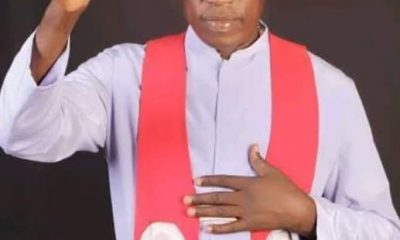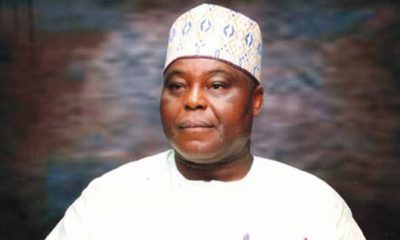News
CBN sets new daily withdrawal limit on PoS

The Central Bank of Nigeria (CBN) has set a daily withdrawal limit on point-of-sale (PoS) terminals to N100,000 per customer.
In a circular to all deposit money banks (DMBs), microfinance Banks, mobile money operators and super-agents, titled ‘Cash-out limits for agent banking transactions,’ CBN said the restriction is in line with the apex bank’s ongoing efforts to advance a cash-less economy.
According to the circular, the interventions aim to address identified challenges, combat fraud and establish uniform operational standards across the industry.
“In view of the above, ALL principals of agents are to comply with the following directives immediately:
i. Issuers shall set a cash withdrawal limit (cash-out) per customer (regardless of channel) to N500,000.00 per week,” the circular reads.
“ii. Ensure that all agent banking terminals are set to a daily maximum transaction cash-out limit of N100,000.00 per customer.
“iii. Ensure that each agent’s daily cumulative cash-out limit shall not exceed N1,200,000.00.
“iv. Ensure that agent banking services are clearly demarcated from merchant activities and that agents apply the approved Agent Code 6010 for agent banking activities.
“v. Ensure that agency banking activities are consummated exclusively through agent float accounts maintained with the principals.
“vi. Monitor accounts associated with the agents’ BVN(S) with a view to identifying agent banking activities which may be conducted outside the designated float account(s).
“vii. Ensure that all agent terminals are connected to a PTSA
“viii. Ensure that all daily transactions per agent, including withdrawals, limits of transactions and balances in the float accounts of each agent, are sent electronically to NIBSS as a repot to the CBN. The template of this report will be sent to principals.”
CBN said as stated in the guidelines for the regulation of agent banking and agent banking relationships in Nigeria, principals would be held fully responsible and liable for all actions and omissions of their agents related to agent banking services.
The apex bank also warned that it would conduct oversight activities, including impromptu back-end configuration checks to ensure compliance.
CBN said breach of the directives contained in the circular will attract appropriate penalties including monetary and/or administrative sanctions.
News
Anambra again: Gunmen kill family of four in Nnewi

A man, his wife and two children have been killed in one attack in Nnewi North Local Government Area of Anambra State.
The victims, identified as Ifeanyi Okeke and his family members, were shot dead in their home in the shocking incident.
According to eyewitnesses, the gunmen invaded the Okeke’s residence, shooting and killing Ifeanyi, his wife, and two of their children.
The motive behind the attack is yet to be ascertained, leaving many questions unanswered and sparking widespread fear and anxiety in the community.
The Anambra State Police Command has confirmed the incident and launched an investigation to unravel the circumstances surrounding the killings.
“We are investigating the incident and working to apprehend the perpetrators,” said the Police Public Relations Officer, DSP Tochukwu Ikenga.
The incident has sparked widespread condemnation, with many calling for increased security measures to protect lives and property in the state.
“This is a heinous crime, and we must work together to ensure that those responsible are brought to justice,” a community leader noted.
The community is in shock and mourning, with many residents paying tribute to the victims and expressing sympathy for their loved ones.
“We are shocked and saddened by this incident. We demand increased security measures to protect our lives and property,” said another resident.
News
Gov Ododo: Kogi not under seige

Governor Usman Ododo of Kogi State has reiterated its unwavering commitment to ensuring the safety and security of lives and property across the state, declaring that it is not paying lip service to the security of its people.
Addressing the media in Lokoja on Friday, the Commissioner for Information and Communications, Kingsley Fanwo, said the administration of Governor Ahmed Ododo has taken concrete steps to deal decisively with insecurity, stressing that the state is not under siege and will not be.
Fanwo acknowledged security concerns in parts of Yagba land, particularly in Yagba West, but assured citizens that the situation is being carefully and silently managed to avoid escalation.
“We are managing the fine line between urgency and the need to tread softly in order not to compound the situation. Government is on top of the matter, and our interventions are guided, targeted, and strategic,” he said.
Fanwo also addressed concerns over alleged threats to some churches in Yagba East, noting that Governor Ododo has ordered thorough investigations to verify the claims.
“Security has not broken down in any part of Kogi and will not break down. We have reached an advanced stage of collaboration with national security structures to neutralise every threat to peace and stability in our state,” he emphasised.
The Commissioner commended local security structures such as the Okun hunters and other grassroots security outfits for their vital role in maintaining peace and order.
“These community-based efforts are critical to our overall strategy, and His Excellency has given the State Security Adviser a marching order to deepen community push-back mechanisms against insecurity,” Fanwo revealed.
He explained that government intelligence has pinpointed the location of certain criminal elements, but cautioned that operational plans are being meticulously executed to avoid collateral damage.
“These criminals are hiding behind innocent Nigerians, many of whom have been kidnapped from Kogi and other states. Our mission is to secure our people without endangering the lives of innocent victims,” he said.
News
Criminal charges: Lawyers ready to defend Natasha with ‘factual evidence ‘

The legal team of suspended Kogi Central Senator, Natasha Akpoti-Uduaghan, say they are ready with factil evidence to defend her in court.
The team received a formal summons in the case filed against her by the Federal Government at the Federal Capital Territory High Court last week.
On Friday, May 16, 2025, the Federal Government filed the suit, marked CR/297/25, over alleged defamatory remarks made during a live appearance on Channels Television’s Politics Today on April 3, 2025.
The government accused the senator of “making imputation knowing or having reason to believe that such imputation will harm the reputation of a person”, citing Section 391 of the Penal Code, cap 89, Laws of the Federation, 1990.
Among the witnesses listed to testify during the trial were Senate President, Godswill Akpabio, and a former governor of Kogi State, Yahaya Bello.
Others include Asuquo Ekpenyong, a senator; Sandra Duru; Maya Iliya, investigating police officers; and Abdulhafiz Garba, investigating police officers.
However, in a statement issued Friday night by Dr. Ehiogie West-Idahosa (SAN) on behalf of the legal team, Akpoti-Uduaghan’s lawyers confirmed receipt of the formal summons and pledged to prepare all “factual and statutory defences” available to the lawmaker during trial.
“At about 2:30pm on Friday, May 23, 2025, within the premises of the Federal Capital Territory High Court, Abuja, we received the information filed by the Director of Public Prosecutions, containing three counts alleging that our client, Senator Natasha Akpoti-Uduaghan of Kogi Central, made imputations she had reason to believe would harm the reputation of Senator Godswill Akpabio, President of the 10th Senate,” the statement read.
“We received the said information on her behalf through a letter of authority duly issued and filed in the court’s registry.
“The legal team will fully prepare and present all factual and statutory defences available to our client during the trial.”
-

 News2 years ago
News2 years agoBreaking: Tinubu’s authentic ministerial nominees
-

 News2 years ago
News2 years ago“Anytime we want to kill terrorists, President would ask us to take permission from France but they were killing our soldiers-” Niger Republic coup leader
-

 News2 years ago
News2 years ago“I’m leaving the Catholic church because Bishop Onah is oppressing me,” says Okunerere
-

 News2 months ago
News2 months agoSenate to speed up conclusion of Nigeria Forest Security Service Bill
-

 News2 years ago
News2 years agoDokpesi and the Gazebo Mystique
-

 News2 years ago
News2 years agoRadio Nigeria’s veteran broadcaster Kelvin Ugwu dies three months after retirement from service
-

 News1 year ago
News1 year agoPersons against Allagoa’s reforms behind protests at NSITF
-

 News2 years ago
News2 years agoTsunami: Tinubu orders dissolution of managements, boards of MDAs, to sack all Buhari’s political appointees

